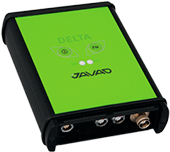 According to Japan's space agency JAXA, "LEX (L-band experiment) is a unique signal from QZSS satellite. The
objectives of LEX signal are to enhance the performance of GPS(realizing improved precision) and to establish the next
generation's positioning based technology". Unlike other known GNSS signals with biphase keying, LEX uses code shift keying
instead. This method required more efforts to receive the data, but has higher bit rate under the same C/N0. Current LEX data
stream is 2000 bits per second, which is significantly higher than for other signals.
According to Japan's space agency JAXA, "LEX (L-band experiment) is a unique signal from QZSS satellite. The
objectives of LEX signal are to enhance the performance of GPS(realizing improved precision) and to establish the next
generation's positioning based technology". Unlike other known GNSS signals with biphase keying, LEX uses code shift keying
instead. This method required more efforts to receive the data, but has higher bit rate under the same C/N0. Current LEX data
stream is 2000 bits per second, which is significantly higher than for other signals.